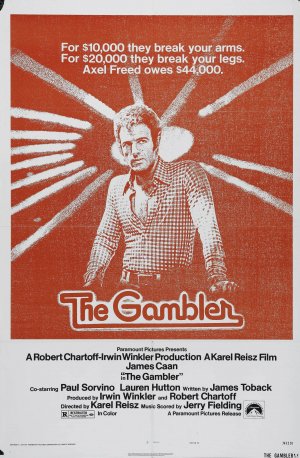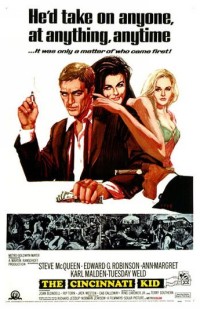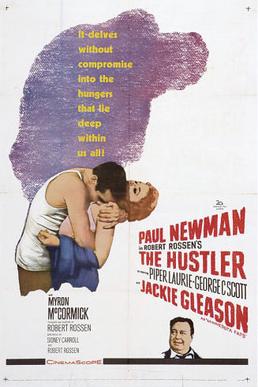At the end of 2014, Mark Wahlberg starred in a remake of the 1974 film The Gambler which was released to mediocre reviews. Quoted at Rotten Tomatoes, reviewer David Kaplan went so far as to call the film’s script “insulting to the audience’s intelligence.” The general consensus seemed to be that despite a solid performance from Marky Mark, this was yet another underwhelming modern gambling flick. Indeed, for the most part, 21st century filmmakers just can’t seem to get this genre right, as project after project fails to capture the intrigue and atmosphere that made so many older gambling films irresistible.
So in the aftermath of the latest modern disappointment (and the latest blizzard keeping us tied to our Netflix! – Ed), here’s a look back at three of the gambling’s finest films.

The Gambler (1974)
We may as well start with the film on which the 2014 Wahlberg movie was based. The 1974 version of The Gambler was a gritty and intense project written by the notorious James Toback, who used it as a creative outlet to deal with his own gambling issues. Essentially a classic story of gambling addiction, the film covers the struggle of Alex Freed (James Caan), a literature professor who borrows money from his mother and girlfriend and then gambles it away while burrowing deeper into problems with all the wrong people.
Though the premise of The Gambler was nothing particularly exciting, its background and execution resulted in it gaining a place among the shortlist of classic gambling films. Loosely based on the Fyodor Dostoyevsky short novel of the same title, it managed to carry a certain sense of the eternal struggle of the gambler. There’s an element to the project that lets you feel Freed’s dilemma, and through it Toback’s, and even Dostoyevsky’s. This is due in large part to the wonderful work of Caan, which in turn was one reason the 2014 film didn’t quite hold up. Mark Wahlberg, if anything, is probably underrated as an actor, and his skill was on full display in the recent film. But there’s no matching the work of Caan, whose casting kept the 1974 version from being ordinary and forgettable.

The Cincinnati Kid (1965)
Possibly the greatest poker film ever made, The Cincinnati Kid must be included in any discussion of the top gambling movies. Directed by Norman Jewison, the film tells the story of an up-and-coming poker star named Eric Stoner. Referred to as “the Kid” (played by Steve McQueen), who has a thirst to prove himself against the long-time master of the game nicknamed “The Man,” played by Screen Actors Guild Life Achievement Award winner Edward G. Robinson.
The film was great for its era, but where it excels is in its portrayal of the one-on-one drama that poker can foster. With internet casinos taking over the industry, this has become a foreign concept to many modern players, since they can reach an expert level at the game without ever meeting a live opponent. It’s simple enough to find a guide in getting started in online poker at a premier online site, learn and practice the basics, and gain experience in tournaments—all from a computer screen or mobile device. But, while this makes for solid at-home entertainment, it’s good to remember it does change the nature of the game. The Cincinnati Kid displays that difference in its purest form, filling us with nostalgia with its dim New Orleans casino settings. Watching the almost sport-like competitiveness unfold, is refreshing and educational for a generation that grew up playing online and watching televised tournaments.

The Hustler (1961)
If you’re curious about the basic plot of The Hustler, refer to The Cincinnati Kid and swap in pool for poker. Naturally there’s more to it, but that’s the basic idea as up-and-comer “Fast” Eddie Felson (Paul Newman) seeks to take down established champion Minnesota Fats (Jackie Gleason) in a high-stakes game. Directed by Robert Rossen, the film has become one of the most critically appreciated gambling films ever made.
Ultimately, two things separate The Hustler from other great movies in the genre. The first is the quality of its cast. Gleason and Newman are heavyweight names, and both deliver high level performances, with Time’s review asserting merely that Newman is “better than usual,” which is saying something given his talent. The second is in its use of pool as the primary game at the center of a gambling film. There’s no point in debating which casino or gambling games may be more entertaining than others, but pool is at least unique in a genre crowded with poker, roulette, and blackjack sagas. In fact, the only other significant film to delve into pool was the improbably but thoroughly enjoyable sequel to The Hustler, 1986’s The Color Of Money. In this film, Tom Cruise joined Newman as Vincent Lauria, a talented protégé looking to make a name for himself. Sound familar?




